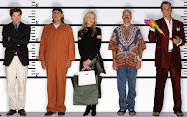From Ted.com:
Dean Ornish shares new research that shows how adopting healthy lifestyle habits can affect a person at a genetic level. For instance, he says, when you live healthier, eat better, exercise, and love more, your brain cells actually increase.You will have two natural observations while watching this: one, that a healthy lifestyle is obviously going to have more benefits than a non-healthy lifestyle, and two, you can't really change your genes, despite what Ornish says. You could also very well agree that your genes are not your fate (as explored in Gattaca). Nevertheless, his research is interesting (half of guys who smoke are impotent), and you will note that marijuana is in the "makes brain bigger" category. Not surprisingly, alcohol decreases brain cells... It's a lot of knowledge in just three minutes. (March 2008, 3:10)
From Ted.com:
Photographer Chris Jordan trains his eye on American consumption. His 2003-05 series "Intolerable Beauty" examines the hypnotic allure of the sheer amount of stuff we make and consume every day: cliffs of baled scrap, small cities of shipping containers, endless grids of mass-produced goods. [...] His latest series of photographs, "Running the Numbers," gives dramatic life to statistics of US consumption. Often-heard factoids like "We use 2 million plastic bottles every 5 minutes" become a chilling sea of plastic that stretches beyond our horizon.This talk will seriously make you think twice about paper cups, prison inmates, and breast implants. This series is along the same vein as that movie Paper Clips, where children collect 6 million paper clips to get an understanding of the 6 million Jews killed during the Holocaust, but Jordan's photographs are more aesthetically relevant to their topics. The breast implant photograph, for instance, is comprised of naked Barbie dolls arranged in a way that, when panned outwards, reveal the shadows and curvature of nipples and breasts. Very interesting series. (February 2008, 11:14)









.jpg)


No comments:
Post a Comment